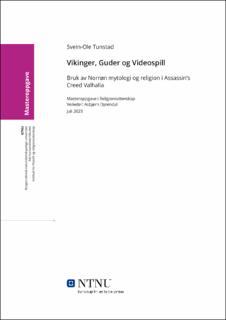| dc.contributor.advisor | Dyrendal, Asbjørn. | |
| dc.contributor.author | Tunstad, Svein-Ole. | |
| dc.date.accessioned | 2023-11-03T18:19:18Z | |
| dc.date.available | 2023-11-03T18:19:18Z | |
| dc.date.issued | 2023 | |
| dc.identifier | no.ntnu:inspera:143488789:9629180 | |
| dc.identifier.uri | https://hdl.handle.net/11250/3100604 | |
| dc.description.abstract | Sammendrag
Denne oppgavens interessepunkt er å se på hvordan norrøn mytologi og religion blir brukt i videospill med hovedfokus på Assassin’s Creed Valhalla. Hoved spørsmålet handler om hvordan Ubisoft og Ubisoft Montréaø har brukt norrøn mytologi og religion i Assassin’s Creed Valhalla, og i hvilken grad norrøn mytologi og religion er til stede i spillets fortelling.
Jeg diskuterer dette interessepunktet og spørsmålet gjennom å se på bruken av spillselskapets promoteringsmateriale i form av trailere sluppet før spillets slippdato, og intervjuer gjort både før og etter spillet har kommet ut. Jeg bruker også mye hentet material fra spillet selv, og setter bruken av myter og mytologi opp mot hverandre for å forstå Ubisoft sine bestemmelser angående fortellingen og hvordan spillselskapet har brukt, endret og sveiset sammen disse mytene for fortellingens del. Jeg avslutter det hele med å se på bruken av volver og seidkvinner, samt tilfeldig religiøsitet som man finner i spillets åpne verden, for å komme til buns i forskningsspørsmålet.
Jeg konkluderer med at til tross for Ubisoft og Ubisoft Montréal sin bestemmelse om å skape et spill som er mer rotfestet i virkeligheten, enn i myter, mytologi og religion, har spillselskapet klart å bruke disse elementene på en egen måte, men samtidig gjort dem gjenkjennelige for personer som har allerede lest dem eller planlegger å lese dem, der det eneste problemet ligger i at store deler av den mytologiske delen ligger bak en valgfri del av spillet som ligger i tråd med Ubisoft sitt ønske om å lage et spill som ligger nærmere virkeligheten. Jeg konkluderer også med at Ubisoft og Ubisoft Montréal sin bruk av religion ligger på den svakere siden, men da ett av målene deres va å få verden til å føles levende på, og å få nordmennene til å oppføre seg som at de faktisk tror på mytene og mytologien, er det feil å si at selskapet har gjort en feil i det valget. | |
| dc.description.abstract | Abstract
This thesis main point of interest is to see how Norse mythology and religion is used in videogames with the main focus being on the game Assassin’s Creed Valhalla. The main research question is about how Ubisoft and Ubisoft Montréal have used Norse mythology and religion in Assassin’s Creed Valhalla, and to what degree Norse mythology and religion is present in the games story.
I discuss this point of interest and research question through looking at usage of the game companies’ promotion material in the forms of trailers released before the games release, and interviews done both before and after the games release. I have also collected material from the game itself, and putting the use of myths and mythology up against it to understand Ubisofts decisions when it comes to the story, and how the company have used, changed and glued together these myths for the wholeness of the game story. I end it all by looking at the use of the volva and seidrwomen, while also taking in the casual religiosity found in the games open world to conclude my research question.
I conclude that despite Ubisoft and Ubisoft Montréals decision to create a game that is rooted more in reality than in myth, mythology and religion, they have managed to use these elements in their own way, while simultaneously making sure they stay recognizable to the people how have read the myths or are planning too. The only problem is that most of the mythological element in this game is hidden behind a optional part of the game, though it stay within the line that Ubisoft has already made for themselves with creating a game that borders more on reality than in myth. I also conclude that Ubisoft and Ubisoft Montréals use of religion is on the weaker side, but because their goal was to create a world where religion was more in the background and more about what people around you believed in in a organic and natural way, it would be wrong to say that they have made an actual mistake. | |
| dc.language | nob | |
| dc.publisher | NTNU | |
| dc.title | Vikinger, Guder og Videospill | |
| dc.type | Master thesis | |
